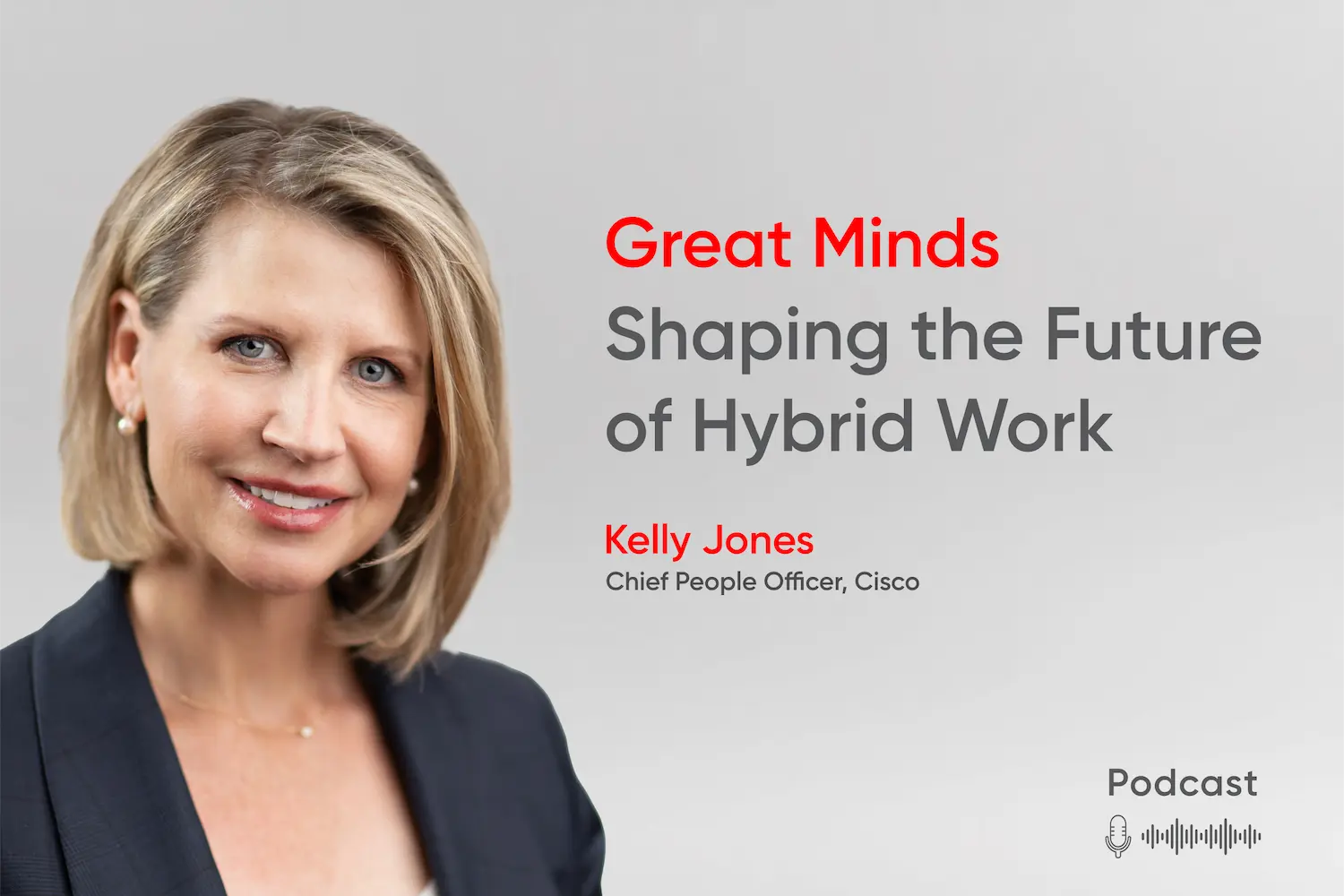“People need flexibility and choice. It's crucial to employee engagement, particularly during times of change, which we're all kind of living in all the time.”
Podcast Highlights
- The Importance of Flexibility in Hybrid Work: Kelly Jones stresses that flexibility and choice are essential for employee engagement, especially in a hybrid work environment.
- Building Trust as a Leadership Priority: Building trust with employees is critical, as it ensures they feel secure even when decisions may not align with their views.
- Weekly Check-ins that Drive Engagement: Managers ask specific questions in weekly check-ins, like “What did you love or loathe this week?” to ensure employees are leveraging their strengths.
- Alternate - Employee Voices Guide Strategy: Cisco’s people strategy is driven by employee input, creating a culture where decisions are made with the workforce, not for them.
On this episode of the Better podcast, Kelly Jones, chief people officer at Cisco, shares what's on her mind as we start a new year. (Hint: trust.)
We also dive into new research around remote and hybrid work, and the impact mandates have.
And, she shares the five questions people managers at Cisco ask in every check-in, including what did you loathe about your week?
On navigating hybrid work successfully:
We don't have a mandate. We were very flexible even before flexible work became a thing. It's been a differentiator for us in how we attract and retain talent.
People need flexibility and choice, it's crucial to employee engagement, particularly during times of change, which we're all kind of living in all the time. What we learned wasn’t that people don't want to come in. They just don't want to come in and work asynchronously. What doesn't work is just saying, "Come in these two days because I want to see you."
The types of things that work that we've seen are aligned to learning, collaboration, and different moments and innovation cycles for brainstorming and celebrations.
On why HR and culture leaders should prioritize trust:
One of the things that is really on my mind is trust. It's the most valuable currency that we have with our employees. Trust followed by time — the amount of time that our leaders spend with our teams.
How we navigate in an increasingly complex world and ensure that our teams always understand the why behind any decisions that we make is really important. One of the things I've noticed is whether your employees always agree with you or not on decisions that you're making — if they trust you and they know that you're doing it with their best interests in mind, and they have a history of knowing that you show up for them, that trust is a very valuable currency for organizations.
On what questions people managers ask in weekly check-ins:
We have kind of a ritualized weekly check-in with our leaders and teams. We ask them to check in and answer a few top-line questions that end up driving a conversation.
- Did you get the opportunity to use your strengths every day this week? One to five.
- Were you able to provide great value this week? One to five.
- How do you feel about the value that you provided?
- What did you love that happened this week?
- What did you loathe that happened?
“Loathe” is intentionally a divisive word because what we're trying to find out is are our employees working in their strengths? And when leaders understand when they're truly leveraging the strengths of their employees, they can better direct them to the type of work where we're going to get the best outcome.
On the secret to making the top of the list for Bestworkplaces in Canada 2024:
Cisco is a big company and I think there's this misperception that there's this huge financial engine. It's not it at all. What is at the center of everything is understanding the experiences of all of our employees.
We have a powerful team in our employee listening space, and one of the things we do at Cisco is we put that at the center of all of our employee design. We've learned that when you design with a community not for a community — even if that community is your entire ecosystem — you are going to get better results.
We are not an organization that sits around as a people team and says, "Gosh, this is a good idea, let's go do it." We don't incubate like that. We incubate through the voices of all of our employees and understanding that becomes incredibly important. That's very much woven into the fabric of our people team and how we go about our work.
I think sometimes you look at talent programs and you assume there's a smart person making decisions about the talent programs. The smart people making our decisions are our employees. They're guiding how we make these choices.
FAQs
- How does Cisco approach hybrid work differently from other companies?
Cisco prioritizes flexibility and choice, allowing employees to work in ways that best suit their needs, fostering engagement and retention. - Why is trust important in a hybrid work environment?
Trust is essential because it builds employee confidence in leadership, ensuring they feel supported even during uncertain times. - What are the key questions Cisco managers ask in weekly check-ins?
Managers ask about strengths, value provided, and what employees loved or loathed about their week to align work with their skills and interests. - How has Cisco maintained its place on the Best Workplaces in Canada List?
Cisco actively incorporates employee feedback into its culture and people strategies, ensuring decisions reflect the voices of its workforce.
Tools & Resources
- Company Culture: Building a strong company culture begins with trust, flexibility, and employee engagement. Learn how to create an inclusive and high-performing culture that resonates with your workforce by exploring our resources.
- Employee Engagement: Employee engagement is driven by providing flexibility and opportunities for meaningful work. Discover strategies to enhance engagement in your organization with our expert insights.
- Leadership & Development: Leadership plays a critical role in building trust and driving employee success. Explore how to develop strong leaders who foster collaboration, innovation, and engagement with our programs.
- Diversity and Inclusion: A diverse and inclusive workplace strengthens employee trust and contributes to long-term success. Learn how to create a more equitable environment through our initiatives.
Feedback
Your insights are important to us! We’re always striving to improve, and we’d love to hear your thoughts on how this article resonated with you. Did the strategies discussed help you think about hybrid work differently? Is there something you’d like to learn more about? Please share your feedback or suggestions with us. Together, we can continue to create valuable resources that support your success. Have feedback? Let us know by [contacting us] or filling out the form below.
Get Certified 
Think your company is a Great Workplace? Get certified today to make it onto our best workplaces lists.

Original Podcast Published by Great Place To Work® USA : Click here to visit the page.






